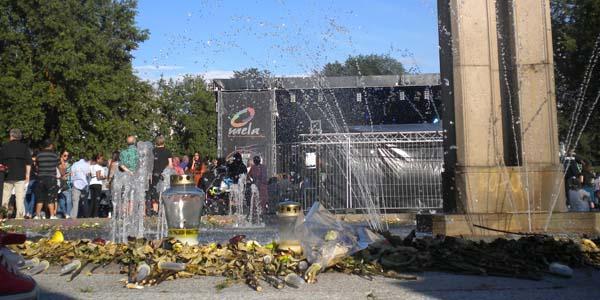Tragedy Transforms Norway Arts Festival
Norway Mela Festival. (Photo: Clark Boyd)
Norway began burying the victims of last Friday’s twin attacks, as the official death toll climbed to 77.
The man who confessed to the killings had ranted against Muslim immigrants and a multicultural Europe. His attack came just a week before the capital Oslo was due to host its annual international arts and culture festival.
This year’s Mela Festival was supposed to last four days. More than 200 Norwegian and international artists were invited to attend. But in the wake of the terror attacks, the festival was scaled back to just a day and a half.
It got under way on Friday evening, just a week after the attacks.
Prableen Kaur, a young survivor of the Utoeya shootings, spoke at the festival, and then musicians laid flowers on the stage to remember the victims.Ӭ
Khalid Salimi is the artistic director of the Mela festival. He was born in Pakistan, but has been living in Norway since 1976. His office is very near where the bomb attack occurred one week ago.
“I was in my office when it happened, and I saw everything trembling down,” Salimi said. Half an hour earlier, he was walking on a footpath next to the Prime Minister’s office building.
“Twenty-nine minutes later, the whole building was bombed. I could have been among those people, you know? Dead.”
Salimi said they’ve retooled this year’s Mela festival to honor the dead and comfort the survivors. But it’s also to stand as a counter-point to the anti-immigrant rhetoric of the confessed killer, Anders Behring Breivik.
“The person who is behind all the murder which took place in Oslo, his main target is that he wants to prevent this country from being culturally diverse. Our festival is basically taking place because we want to expose audiences to the cultural and artistic diversity,” Salimi said.
One Norwegian band that took stage is “Queendom” – an all-female, all-black performing arts group. Asta Busingye Lydersen is the daughter of a Norwegian and a Ugandan.
“I was like the first generation of African-Norwegians that grew up here. We grew up here, we knew the cultural codes, we knew the Norwegian songs, we felt Norwegian. But we really felt that the term Norwegian wasn’t broad enough to encompass us,” she said.
That’s one of the reasons she got into music: to find a way to feel included.
“As time has gone by, I feel like the term Norwegian has become something much broader. And people have struggled, and people of different ethnic and religious backgrounds have struggled to be able to claim this country as ours,” Lydersen said.
Up until last Friday, Lydersen said, many in her mixed neighborhood in Oslo would have said they’d made good progress.
But immediately after the attacks suspicion fell on Muslim extremists. Lydersen says she was scared.
“I kept thinking, oh no, because this will fuel that hatred. And then it turned out to be, as Norwegians say, one of us. But I’m thinking why did he do it? He did it because he hates Muslims, he doesn’t want this country to be the diverse, open, democratic country that we love. So sometimes I feel like the bad guys win, no matter what,” she said.
Lydersen said she knows that Breivik’s words point to an underlying unease over the increasingly diverse ethnic makeup of today’s Norway.
The changing face of Norway was evident at Friday night’s Mela Festival. Norwegians of South Asian and African descent turned out to hear the performances. They said that despite the night’s sense of unity, they know that Norway is wrestling with some difficult questions about who it is and where it’s heading.
The story you just read is accessible and free to all because thousands of listeners and readers contribute to our nonprofit newsroom. We go deep to bring you the human-centered international reporting that you know you can trust. To do this work and to do it well, we rely on the support of our listeners. If you appreciated our coverage this year, if there was a story that made you pause or a song that moved you, would you consider making a gift to sustain our work through 2024 and beyond?
